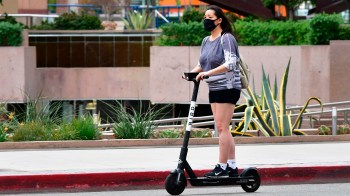Bike-share system to roll out on New York City streets
Kai Ryssdal: Forget Priuses or light rail. The latest transportation craze in a lot of big American cities is the humble bicycle — bike sharing, to be specific. Short-term, one-way bike rentals.
Today, New York City announced it’s going to have 10,000 bikes in place by next summer. Not that these kinds of programs are without their own traffic jams. Andrea Bernstein reports from the Transportation Nation project at WNYC.
Andrea Bernstein: In New York today, the city’s Transportation Commissioner Janette Sadik-Khan couldn’t have been happier.
Janette Sadik-Khan: So we are here today to announce that the wheels are officially in motion for New York’s bike-share program.
Sadik-Khan says bike share can fill a gap in the transit system.
Sadik-Khan: There are times where you can’t find a cab or you can’t find the bus, subway is not going to work. So it’s perfect for those short trips from point A to point B.
When New York’s system is fully in place next year, members will be able to take any bike, anywhere. They won’t have to make a reservation; they won’t have to say where they’re going, and they’ll even be able sign up for just one day.
David Knight: It’s outside my office, outside my home, outside my meeting, outside where I want to get lunch. It’s wonderful.
In Washington D.C., commuter David Knight says he uses that city’s year-old bike share all the time to get to work, and for other trips.
Knight: I was across town and it wasn’t raining, so I picked it up last minute.
That flexibility has made bike-share unexpectedly popular in D.C. More than 70,000 tourists and other casual users signed up the first year — dwarfing the 15,000 yearly members. That kind of impulse purchase has some unexpected consequences.
Eric Gilliland of Alta Bike Share, which operates D.C.’s system, says its busiest hour ever was after last month’s rare earthquake.
Eric Gilliland: It was just impossible to get around any other way.
Cars and buses were at a standstill, metro trains were full.
Gilliland: In the span of an hour, we pretty much emptied out everything in the downtown area, which all ended up flooding out to the neighborhoods.
That can be a problem even on a regular day. In D.C. in July, bike stations were empty 9,000 times. And there were 5,000 incidences where stations were completely full, so cyclists couldn’t return their bikes. As a result, the bikes have to be loaded on trucks, and moved around.
Almost every city that’s tried bike share has experienced some version of that phenomenon. In London, suburbanites take the train part way and then bike for the rest of their trips. All the bikes end up in the center of town. In Barcelona cyclists go downhill, but not up.
Catherine Maurency of Montreal’s Ecole Polytechnique has analyzed the data. She says when it comes to distributing bikes around a city, crowds are just not perfect.
Catherine Maurency: For instance, if there’s a subway breakdown you will have issues because there will be no more bikes and all these regular patterns will disappear. If it rains in the morning and it’s sunny in the afternoon, then all the patterns change.
Officials say adding more bikes and more stations will help solve the problem. Chris Holben, of D.C.’s transportation department, says having too much demand is a good problem, in a way.
Chris Holben: Basically we are starting a new transit system overnight. That means all the infrastructure, all the service systems, and then all the staff.
That’s what New York wants to do, beginning mid-2012. And bike-share systems are under consideration for San Francisco, Seattle, even L.A.
In New York, I’m Andrea Bernstein for Marketplace.
There’s a lot happening in the world. Through it all, Marketplace is here for you.
You rely on Marketplace to break down the world’s events and tell you how it affects you in a fact-based, approachable way. We rely on your financial support to keep making that possible.
Your donation today powers the independent journalism that you rely on. For just $5/month, you can help sustain Marketplace so we can keep reporting on the things that matter to you.


















